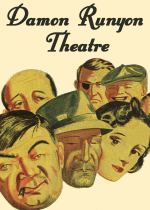
| Damon Runyon Theater | |
| Available Episodes: | 52 |
| Latest Episode: | Damon Runyon Theater 52 - Dream Sweet Rose | Uploaded: Mar 20, 2017 |
| Categories: | Humor |
| Airing History: | Episodes: 52 |
| Alfred Damon Runyon (October 4, 1880 - December 10, 1946) was an American newspaperman and short-story writer. He was best known for his short stories celebrating the world of Broadway in New York City that grew out of the Prohibition era. To New Yorkers of his generation, a "Damon Runyon character" evoked a distinctive social type from Brooklyn or Midtown Manhattan. The adjective "Runyonesque" refers to this type of character as well as to the type of situations and dialog that Runyon depicted. He spun humorous and sentimental tales of gamblers, hustlers, actors, and gangsters, few of whom go by "square" names, preferring instead colorful monikers such as "Nathan Detroit", "Benny Southstreet", "Big Jule", "Harry the Horse", "Good Time Charley", "Dave the Dude", or "The Seldom Seen Kid". His distinctive vernacular style is known as "Runyonese": a mixture of formal speech and colorful slang, almost always in present tense, and always devoid of contractions. He is credited with coining the phrase "Hooray Henry", a term now used in British English to describe the upper class version of a loud-mouthed, arrogant twit. Runyon's fictional world is also known to the general public through the musical Guys and Dolls based on two of his stories, "The Idyll of Miss Sarah Brown" and "Blood Pressure". The musical additionally borrows characters and story elements from a few other Runyon stories, most notably "Pick The Winner". The film Little Miss Marker (and its three remakes, Sorrowful Jones, 40 Pounds of Trouble and the 1980 Little Miss Marker) grew from his short story of the same name. Runyon was also a newspaper reporter, covering sports and general news for decades for various publications and syndicates owned by William Randolph Hearst. Already known for his fiction, he wrote a well-remembered "present tense" article on Franklin Delano Roosevelt's Presidential inauguration in 1933 for the Universal Service, a Hearst syndicate, which was merged with the co-owned International News Service in 1937. Runyon's short stories are told in the first person by a protagonist who is never named, and whose role is unclear; he knows many gangsters and does not appear to have a job, but he does not admit to any criminal involvement, and seems to be largely a bystander. He describes himself as "being known to one and all as a guy who is just around". The radio program The Damon Runyon Theatre dramatized 52 of Runyon's works in 1949, and for these the protagonist was given the name "Broadway", although it was admitted that this was not his real name, much in the way "Harry the Horse" and "Sorrowful Jones" are aliases. | |
You are WELCOME to enjoy our site & read ALL our books online. But to download & join our forum please create a FREE account or
login


